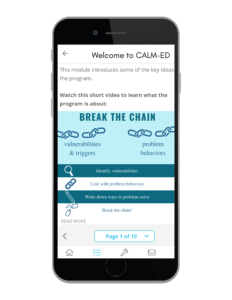Developing a Digital Intervention for Individuals with Eating Disorders Who Are Publicly-Insured or Uninsured
Individuals from lower socioeconomic status (SES) backgrounds, including those without health insurance and on public insurance, have extremely limited access to eating disorders (EDs) treatment. Indeed, in collaboration with our team, NEDA’s evidence-based online screen for EDs identified that 77% of adult screen completers across one year (73,000 adults) with EDs are not receiving treatment, of whom over 14,000 (19%) would likely qualify for Medicaid based on their household income (<$20,000), including racially diverse individuals (29%) and Latinx (15%) individuals. Unfortunately, these individuals have very limited access to any kind of treatment for EDs, let alone high-quality treatment. For those who have public insurance, there is a significant health inequity in access to quality care because providers in publicly-funded settings, like community mental health centers, typically lack training in EDs, and the delivery of evidence-based treatments for EDs in these settings lags far behind service delivery for other psychiatric disorders.
Scalable approaches for increasing access to evidence-based treatments for EDs are greatly needed, particularly for vulnerable populations. Digital technologies have great potential to increase access and quality of ED treatment by overcoming barriers to ED treatment, including stigma, shame, and practical barriers, like cost and availability of treatment. Our team previously developed a digital, coached cognitive-behavioral therapy (CBT)-based online program for EDs, which has demonstrated effectiveness in undergraduate female students with EDs. Realized treatment access is three times greater for the digital program compared to referral to usual care, with robust improvements in ED psychopathology and impairment that are sustained at long-term follow-up. You can learn more about our findings in an article we published in JAMA Network Open or in this write-up in U.S. News and World Report. However, this intervention has only been tested with college students, despite high need in other populations. Research shows that cultural adaptation greatly improves treatment relevance, acceptability, effectiveness, and sustainability. By leveraging this existing digital intervention, our team can provide immediate, cost-effective treatment to vulnerable individuals with EDs who have a higher likelihood of experiencing inequities in access to care, and who have been traditionally ignored in the development and testing of treatments for EDs.
We have been very fortunate to receive funding from NEDA’s Feeding Hope Fund to tackle the critically important issue of increasing access to treatment for individuals with EDs from lower SES backgrounds. As part of this study, first, we will adapt the mobile intervention for this population by collecting data on intervention feasibility and acceptability through a needs assessment with individuals with lived experience, as well as by gathering feedback from our partners who work in publicly-funded mental health settings. We are currently recruiting for this phase of the study through a brief online screener accessible here. Second, we will examine the feasibility, acceptability, usability, and effectiveness of the adapted program in a trial of 30 adults with EDs. We are so thrilled to have the opportunity to conduct this work because of NEDA’s support, which could ultimately result in widespread access to an evidence-based treatment for EDs for individuals from low SES backgrounds.
Ellen Fitzsimmons-Craft, PhD (she/her/hers) is an Associate Professor of Psychiatry at Washington University School of Medicine in St. Louis and a licensed clinical psychologist. She has established programmatic lines of research centering on the use of technology for eating disorder prevention and treatment, eating disorder screening, sociocultural etiological and maintenance factors for eating disorders, and eating disorder recovery. Ultimately Dr. Fitzsimmons-Craft’s work aims to disseminate evidence-based interventions from research to practice as well as extend treatments in ways that will reach the large number of people in need of care for mental health problems but who are not receiving services. She is a Fellow in the Academy for Eating Disorders, is a current recipient of a National Institute of Mental Health K08 Career Development Award, and has authored more than 110 peer-reviewed publications that have been collectively cited over 4,000 times in the literature. Dr. Fitzsimmons-Craft is passionate about increasing access to scalable, evidence-based mental health services, collaborating with numerous non-profit organizations, including the National Eating Disorders Association (NEDA) and the National Association of Anorexia Nervosa and Associated Disorders (ANAD), and statewide groups in the U.S. in order to do so. Her work has been featured in high-profile media outlets including Wired, Forbes, Scientific American, Slate, and The Verge.
Erin C. Accurso, PhD (she/her/ella) is Associate Professor of Psychiatry and Behavioral Sciences at the University of California, San Francisco (UCSF), and Clinical Director of the UCSF Eating Disorders Program. Dr. Accurso studies mental health service delivery, including racial and ethnic disparities in treatment access and health care utilization in youth with eating disorders insured by Medicaid. Her research focuses on improving access to effective care for racially and ethnically diverse people with eating disorders who have public insurance, with a focus on effective, affordable, and scalable interventions at both the provider level (e.g., training) and at the patient level (e.g., digital interventions). Dr. Accurso is on a mission to ensure that all people with eating disorders have access to evidence-based treatment, with a lens towards health equity to improve services for youth with public insurance and other underserved individuals who have historically had poorer access to evidence-based treatment.





